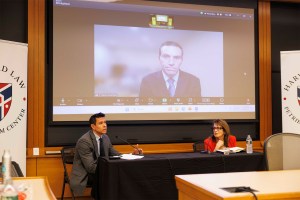Science & Tech
-

Harsh past might bare its teeth
Early adversity leads to higher aggression and fearfulness in adult canines, study says

-

What will AI mean for humanity?
Scholars from range of disciplines see red flags, possibilities ahead
-

‘Human exceptionalism is at the root of the ecological crisis’
Saving the planet requires getting over ourselves, argues author of ‘The Arrogant Ape’
-
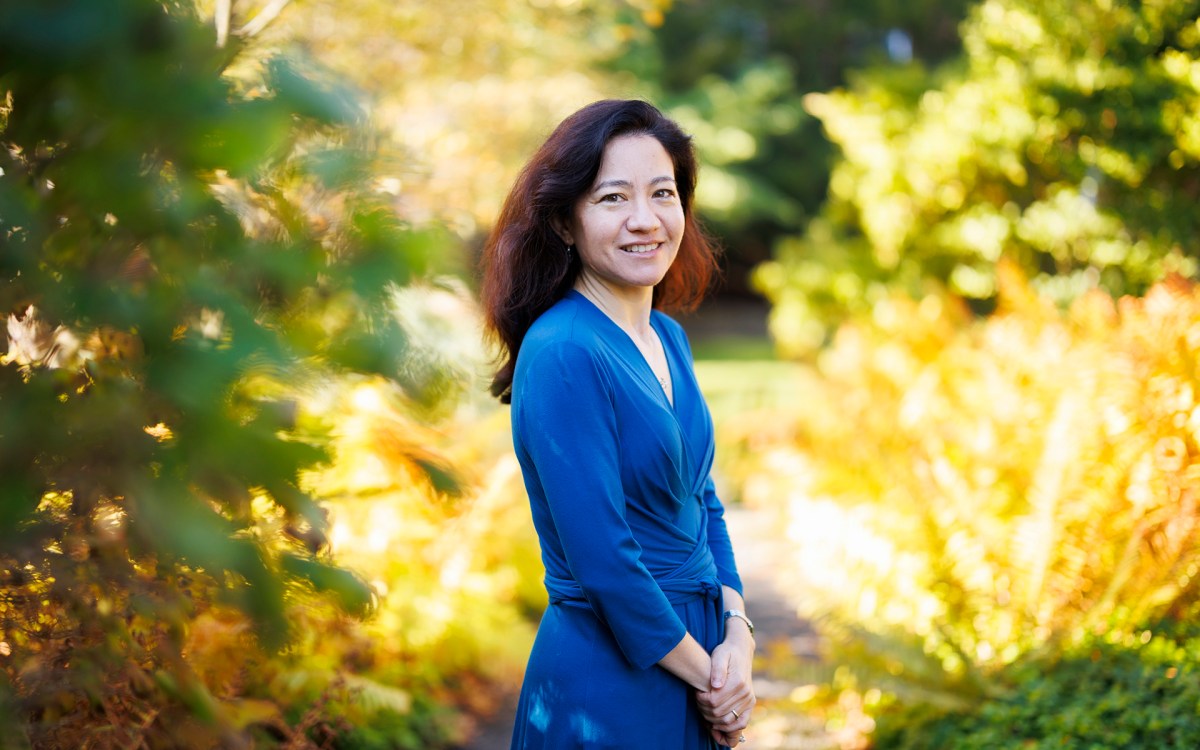
Lauren Williams awarded MacArthur ‘genius grant’
Math professor honored for theoretical breakthroughs with sometimes surprising applications across phenomena such as tsunamis, traffic
-
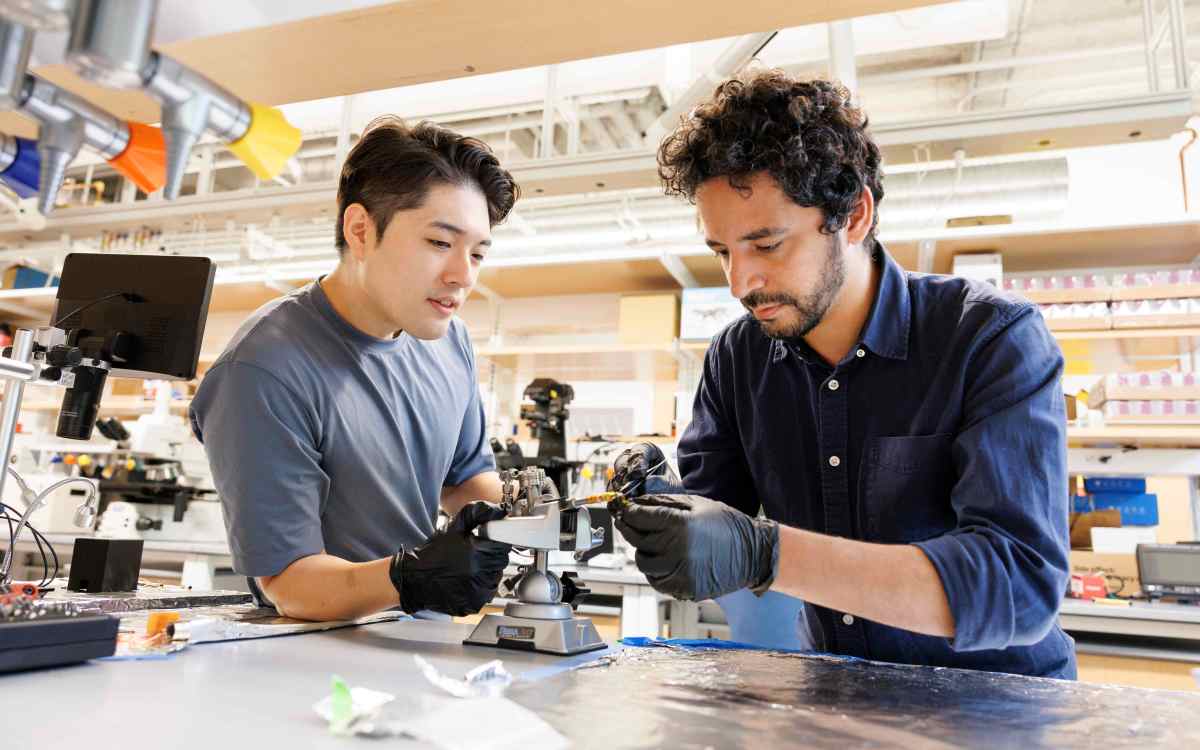
-
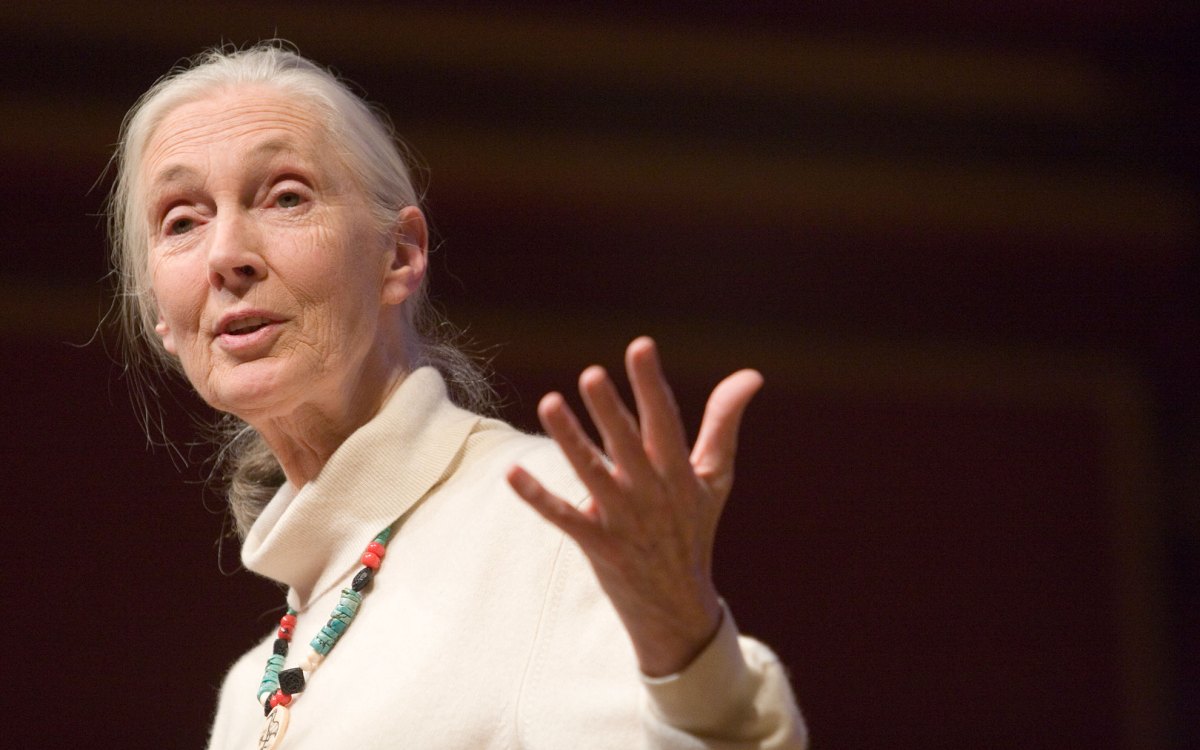
‘She had a sense of caring for everybody that she encountered.’
Richard Wrangham remembers his teacher and colleague Jane Goodall as a force of science, empathy, and hope
-
Fair shows progress of humanities in digital world
Bill and Carrie meet in a Harvard College library you might know. The walls are reddish stone and in one corner a working fireplace blazes brightly.
-
‘Bicycle Environments’ takes HSPH and GSD students for a ride
At a time when the United States scrambles to resolve the country’s obesity epidemic, reduce greenhouse gas emissions and air pollution, and lessen dependency on foreign fossil fuels, this semester the Harvard School of Public Health (HSPH) and the Graduate School of Design (GSD) have launched an interdisciplinary course that tackles all three problems (and more). Titled “Bicycle Environments in the U.S. and the Netherlands/Denmark: Case Studies in the Promotion of Physical Activity,” the class uses case studies to examine how the bicycle communities in the Netherlands and Denmark help individuals stay healthy and reduce greenhouse gas emissions. One clear objective is to find strategic ways to make the United States more bicycle friendly in an attempt to address these central social issues.
-
Robotic radical hysterectomy has advantages
New technologies now allow surgery to be performed with less impact on patient quality of life. As the trend toward minimally invasive surgery grows, robotic-assisted surgery has become an appealing tool for gynecologic oncology surgeons. However, to date, there is little data to confirm the benefits of this technology. New research from Brigham and Women’s Hospital (BWH) compares robotic radical hysterectomy (RRH) using the DaVinci robot to classically performed open radical hysterectomies (ORH) in patients with stage I and II cervical cancer. Researchers found that RRH results in lower blood loss and shorter length of stay compared with ORH. The findings are available online and published in the December print issue of Gynecologic Oncology.
-
Idle computing power may ID candidate molecules for efficient solar panels
The world today uses enough power to illuminate 150 billion light bulbs for a year. According to some estimates, by 2050, demand will double, creating irreversible climate change without reductions in humanity’s carbon output.
-
Modeling the forest … and the trees
When building computer models of the ecosystems that cover the earth’s surface, it is tempting to incorporate sweeping generalizations in your calculations.
-
Researchers study glaciers on Earth’s coldest desert
It’s December, and undergraduate Jenny Middleton bundles up to face the cold. While all across campus, students, and faculty don their winter gear, Middleton is not preparing for the New England winter; she is preparing for an expedition through the Earth’s coldest desert: the McMurdo Dry Valleys in Antarctica.
-
Climate options must include ‘all of the above’
Climate change has so much momentum behind it that “either/or” discussions about options are meaningless because it’ll take all we can do just to arrest carbon dioxide at levels double those in preindustrial times, a top climate scientist said Dec. 11.
-
Shai Agassi dreams of a gas-free future
Electric cars with zero emissions. Powered by renewable energy. All over the world. That is Shai Agassi’s dream. The 40-year-old Israeli entrepreneur left a lucrative corporate software track last year to found Better Place, a transportation company based on sustainability and independence from oil.
-
Lovins: Protecting the environment is ‘a highly profitable enterprise’
As U.S. automakers plead for a government bailout, the next great automotive revolution is already under way, as Japanese automakers plan for a generation of lightweight cars that vastly increase mileage and whose advanced materials pay for themselves through dramatically streamlined assembly and smaller engines, an energy expert said Wednesday (Dec. 3).
-
Of Neanderthals and dairy farmers
Harvard Archaeology Professor Noreen Tuross sought to rehabilitate the image of Neanderthals as meat-eating brutes last week, presenting evidence that, though they almost certainly ate red meat, Neanderthal diets also consisted of other foods — like escargot.
-
Thinking globally and mapping locally
Akiyuki Kawasaki thinks globally and maps locally. To do that, the Japanese researcher, who is spending the academic year as a visiting scholar at Harvard’s School of Engineering and Applied…
-
Having happy friends can make you happy
If you’re happy and you know it, thank your friends — and their friends. And while you’re at it, their friends’ friends. But if you’re sad, hold the blame. Researchers…
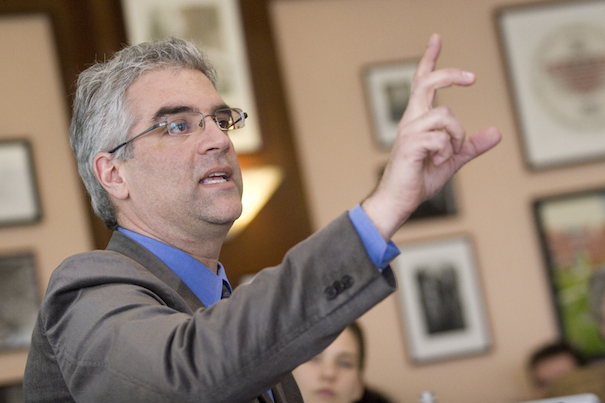
-
Scientists explore nature’s designs
As a graduate student, Harvard physical chemist Joanna Aizenberg acquired a passionate curiosity about — of all things — sponges. She particularly liked the ones made of glass, whose apparent fragility belied the fact that they could withstand terrific pressure in the deep sea.
-
Students looking to light African night
Some current and former Harvard students have joined forces in an effort to apply new technology to an old problem: how to light Africa’s rural areas far from modern power supplies.
-
Woolsey: New technologies will make need for oil obsolete
Salt was once highly valued as a preservative for meat, but eventually a new technology — refrigeration — greatly reduced its value. Today, rather than a contentious commodity, salt is a humdrum condiment.
-
U.S. energy answers there for the taking, says Amory Lovins
As U.S. automakers plead for a government bailout, the next great automotive revolution is already under way, as Japanese automakers plan for a generation of lightweight cars that vastly increase…
-
Strong evidence brown dwarfs form like stars
Astronomers have uncovered strong evidence that brown dwarfs form like stars. Using the Smithsonian’s Submillimeter Array (SMA), they detected molecules of carbon monoxide shooting outward from the object known as…
-
Looking at the universe, one particle at a time
Masahiro Morii is a tinkerer at heart, looking under the hood of the universe in hopes of finding unseen particles that explain how it all works.
-
Humanity may hold key for next Earth evolution
Human degradation of the environment has the potential to stall an ongoing process of planetary evolution, and even rewind the evolutionary clock to leave the planet habitable only by the bacteria that dominated billions of years of Earth’s history, Harvard geochemist Charles Langmuir said Thursday (Nov. 13).
-
Quantum computers could excel in modeling chemical reactions
Quantum computers would likely outperform conventional computers in simulating chemical reactions involving more than four atoms, according to scientists at Harvard University, the Massachusetts Institute of Technology (MIT), and Haverford College. Such improved ability to model and predict complex chemical reactions could revolutionize drug design and materials science, among other fields.
-
Moral dimensions of ‘the scientific life’
Scientific knowledge is reliable and it is authoritative. It is also often understood to be impersonal: The personal characteristics of a researcher are not thought to influence his or her findings. In recent work, historian Steven Shapin assumes the reliability and authority of scientific knowledge but illustrates how scientists’ personal characteristics and traits figure prominently in the making, maintenance, and perceived authority of scientific knowledge.
-
Student diggers take Harvard’s roots from dirt to display case
Emily Pierce ’10 was up to her hips in Harvard Yard, standing in a square hole in the ground, carefully scraping soil as she sought bits of archaeological treasure: a…
-
Global warming predicted to hasten carbon release from peat bogs
Billions of tons of carbon sequestered in the world’s peat bogs could be released into the atmosphere in the coming decades as a result of global warming, according to a new analysis of the interplay between peat bogs, water tables, and climate change.
-
Wildlife Conservation Society chief outlines scenarios
From the complex social structure of elephant herds to the understanding that gorillas are susceptible to deadly “human” diseases to the impacts of climate change, conservationists are struggling to balance a suite of challenges unknown in past generations.
-
David Clarke appointed as professor of materials in School of Engineering and Applied Sciences
David R. Clarke, an inventive materials scientist recognized worldwide for his out-standing contributions to the study of ceramic materials, has been named Gordon McKay Professor of Materials in Harvard University’s…
-
Evelyn Hu named professor of applied physics, electrical engineering in SEAS
Evelyn L. Hu, a pioneer in the fabrication of nanoscale electronic and photonic devices, has been named Gordon McKay Professor of Applied Physics and Electrical Engineering in Harvard University’s School…
-
10 ways to help
1. Drive less: Walk, bike, and take public transportation instead. Check out the Harvard Commuter Choice Program for information on ridesharing, discounts for MBTA passes, and more.
-
Lecture ‘Can’t you see I’m busy’ addresses ‘interruption management’
You’ve opened a Microsoft Word document and are just about to write. Feel good? No. Instead of inspiration, along comes Clippy, the annoying little pop-up man with his bobbing eyebrows and balloon full of intrusive questions. “It looks like you’re writing a letter. Would you like help?”
-
Solar system’s twin has two asteroid belts
Astronomers have discovered that the nearby star Epsilon Eridani has two rocky asteroid belts and an outer icy ring, making it a triple-ring system. The inner asteroid belt is a virtual twin of the belt in our solar system, while the outer asteroid belt holds 20 times more material. Moreover, the presence of these three rings of material implies that unseen planets confine and shape them.
-
Records dating back to Thoreau show some sharp shifts in plant flowering near Walden Pond
Drawing on records dating back to the journals of Henry David Thoreau, scientists at Harvard University have found that different plant families near Walden Pond in Concord, Mass., have borne…


